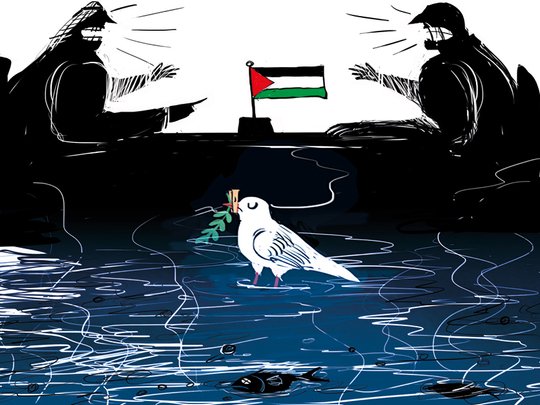
All’s well and good. Hamas agrees to disband and the prime minister of the Palestinian National Authority arrives in Gaza accompanied by dozens of officials — reportedly to a hero’s welcome from thousands of well-wishers lining the streets — as part of an ambitious effort to end the bitter rift between the two sides and make way for a unity government.
All’s well and good, I say, for ordinary Palestinians who wish to see their people united. One of these ordinary Palestinians, a 22-year-old woman from Gaza City, “who covered her shoulders with a Palestinian keffiyah”, was quoted by the Associated Press as saying, “Yes, it’s difficult, and not easy to move forward, but we have to be optimistic this time”.
Optimism is indeed in order. After a decade of relentless siege, and three scorched-earth wars launched against it, Gaza has numerous problems that can only be described as crushing. Which one of these problems do you give priority to, when the time for problem-resolution is at hand? Ask the majority of Gazans that question, and I hazard to guess it will be this: Return the clean, azure waters of our sea to us.
Forget all the calamities Gazans have endured for all these years — a feat of moral sleight of hand, of if you ask me — bar one: What has happened to their beloved sea.
Drive down along the 26-mile (42km) long stretch of coast, from one end of Gaza to the other, and you will be assaulted, as a news report in the Washington Post earlier this week explained, by an overpowering putrid stench. The reason? For several hundred yards out to sea, a brown hue stains the water — it is the detritus of 100,000 cubic metres of raw sewage that has flowed there each day this year, presumably because, destitute and indigent, Hamas was unable to the pay the utility bills. This resulted in the cutting off of power supply to the impoverished territory, which in turn resulted in the shutting down of all sewage treatment plants there. .
Fishermen, to whom the sea is an ecosystem on which their livelihood strategies depended, and who at any rate are already hobbled by restrictions on fishing beyond six nautical miles from the shore by their Israeli military occupiers, are feeling the impact on their ability to feed their families — and there are 3,600 fishermen in Gaza, most of whom sole breadwinners. In the old days, these folks would daily line the road that hugs the shoreline to sell their catch, at least to those in Gaza who could afford to buy fish.
But no longer.
Gazans these days are not buying fish, certainly not fish caught in such dreadfully polluted waters.
This degradation of the environment has not touched only the lives of fisherman, but the lives of each one of the two million men, women and children who live in Gaza — and touched it in what can be described as a spiritual way. Gazans, you see, are a sea people. And to sea people the sea is not just a place where you swim, sail and fish. Not just a place where, as Gazans had done for generations, where you took your family to seaside cafe on weekends, where they listened to the waves breaking on the rocks, inhaled the smell of sea salt, felt one with the sea breeze and experienced the magic of the sunset.
That’s only one half of it. For sea people — and I am one such, from the city of Haifa — the sea is where you are. You will never be quite as happy anywhere else. And who has been, in human history, more adept at inventing metaphor than Mediterraneans? This is a sea that for centuries has defined for people who lived by it how to articulate their common parlance, their turn of phrase and their idiomatic allusions — in short, the semantic fashions of expression needed to communicate meaning and feeling.
For those of us who were born and grew up by the sea, we never fail to sense that our soul was bred of water, regardless of how long we had been severed from our habitat. It’s really a part of our teleological spirit of history — and faith. For in Verse 21:30 in the Holy Quran we read: “From water we have created all living things.”
Washington Post correspondent in Palestine, Loveday Morris (a resonant name, you will agree) filed a report from Gaza City last Sunday in which he addressed the disastrous fate that had befallen the sea that Gazans love so dearly. He wrote in his lead: “The beach has long provided much-needed relief for the two million residents of Gaza Strip, cut off from the rest of the world. They come to swim, play soccer, relax, or as many poetically put it — speak to the sea.” Then he quoted a young Gazan as saying: “It’s like talking to a friend, one that won’t gossip. It washes away the stresses and the problems”.
For Gazans today, as it has been for all time since their Canaanite ancestors inhabited their little strip of land 4,000 years ago, the sea was ever-present, but not ever-present in its present form — a stench-emitting, sewage-covered monstrosity.
Palestinian leaders, negotiating in Gaza, will have their work cut out for them as they set out to resolve their political problems. In Gaza today, they have an ecological problem that is much more pressing and, I submit, much more significant than any other. We cannot live in a vibrant, prosperous, zestful society if we pollute the environment in which that society exists and on whose bounty a people depend for both their economic and spiritual survival.
Fawaz Turki is a journalist, lecturer and author based in Washington. He is the author of The Disinherited: Journal of a Palestinian Exile.









